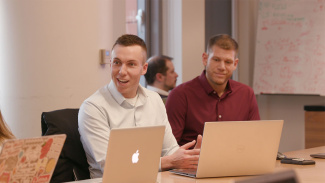What Happens When an LBLE/Retail Consulting Project Meets a Global Pandemic

By peter christiani, mba '20
I was entering my second semester participating in the Living Business Leadership Experience – or LBLE – and I was eager to continue to build on the momentum my team had established.
LBLE is a core part of Michigan Ross’ action-based learning curriculum in which business students are paired with real-world businesses to test and implement new initiatives.
I was working with State & Liberty, a company that makes high-end dress clothing for athletically built men. In the first semester, my team devised an efficient means for expanding their business that we refined through weekly meetings with Steven Fisher and Lee Moffie, the co-founders. As I entered the second semester, we were so confident in our plan that in our kickoff meeting, we set an ambitious target for the number of new customers we could gain, and we backed this goal with what could best be described as a friendly wager.
Our plan to achieve our lofty goal centered on getting people to try on the clothing. State & Liberty’s competitive advantage is their breathable, tapered fit; once people tried the clothes, they were hooked. We planned to grow through on-brand events, including whiskey tastings, entrepreneurship talks, and pull-up competitions – all of which included an element of trying on the clothes. In March 2020, we had our first five events planned, and we were ready to take the campus by storm.
But then – well – March 2020 happened.
The novel coronavirus spread across the country, and a business that was established on brick-and-mortar retail stores and event-based marketing needed to pivot. While it was disruptive to our semester plans, we knew the impact would be magnified for Steven and Lee. As opposed to waiting for direction, we took a proactive approach to pivot. We quickly developed several ideas on how we could move our customer acquisition strategy digitally, developing a brief and sharing for approval.
Several of our projects were greenlit, such as an email acquisition optimization test and the development of a dashboard to track performance of the new sales strategy. Despite our best efforts, we never hit our acquisition target. Even with the dramatic shift in our semester plans, the experience taught me several important lessons:
- Prototype – Don’t Pitch – Ideas: The co-founders had so much more to deal with outside of working with us students. We decided to kickstart our projects so we could give them a better example of what the output might be. In doing so, we allowed them to quickly understand and approve / disapprove ideas, as opposed to trying to talk them through ideas and force them to picture the impact.
- In Times of Crisis, No One Has a Plan: The uncertainty that plagued our team meetings was only amplified in boardrooms across the country. No one had a playbook to deal with the crisis, and all we could do was engross ourselves in data and consider efficient means for sustaining the core strategies of the business.
- All Activities Should Support Your Competitive Advantage: The pandemic was tough for a business whose competitive advantage was the feel of their clothing. Nonetheless, it was important for us to not abandon that messaging. We adapted it to a digital world through referral programs, highlighting customer reviews, and A/B testing messaging to determine what is most viable. If you are deviating too far from what customers love about your product or service, you should reconsider why you are doing so.
The semester of LBLE could best be described as unique, but it was one that will have value to me as I launch my own career in the entrepreneurship world. I am thankful to have worked with my team to tackle these challenges, and to have been able to work so closely with State & Liberty’s leadership team.








